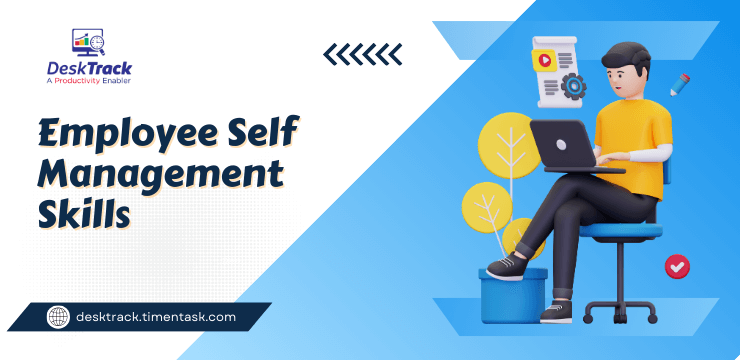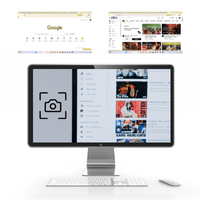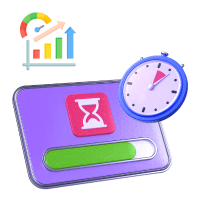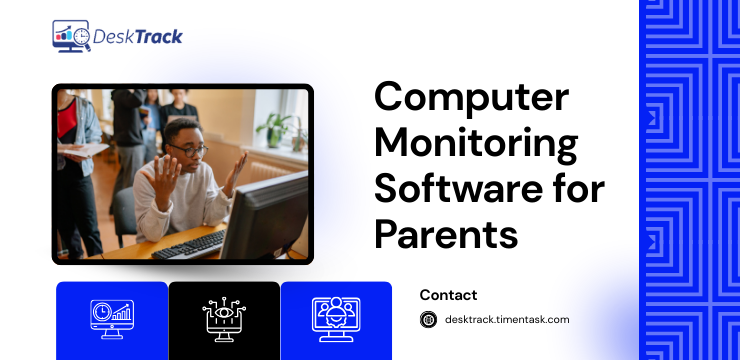Self awareness, prioritization, adaptability, discipline, and Employee self-management skills. Did all these words ring a bell? Our elders always used to emphasize honing these skills. However, why? Now that we are working jobs or businesses, we have understood that these are not just mere words but the way to navigate the complexities of modern work life.
However, what should be our starting point? Can we begin developing and improving these skills right away? No, of course not. We must first have some clue about what skills for managing self are. It’s simple. How can we improve something that we have no clue about? So that’s that.
In this blog, as working professionals and expert guides, we will take you through the top 15 employee self management skills and related concepts. By the end of the post, you will have a complete idea of how you can pull yourself together for more success. So, let’s dive right into it.
What are Self Management Skills?
In simple terms, the 15 skills for managing self are about managing our capacity for consciousness and the usefulness of our actions, thoughts, and emotions.
A person with great employee self management skills is aware of what actions to take and how to behave in various circumstances. They know how to contain their rage when their employer uses harsh words for not delivering the job on time. Moreover, they are aware of how to stay focused and effective while working from home by avoiding distractions. They are aware of what must be done to reach their fitness objectives, and they do it.
You can increase productivity, enhance workplace performance, and effectively accomplish professional goals by developing these skills. Furthermore, they may boost your employability and better control your professional path by developing your self-management skills.
Employers prefer hiring candidates who carry strong skills for managing themselves in the workplace, especially when they find it hard to regulate their thoughts and emotions and wind up snapping at a client or saying unpleasant things. These abilities help individuals better control their behavior, which results in more intelligent workplace decisions.
Read Also: Top 15 Employee Scheduling Software for Businesses in 2024
Why Are Self Management Skills Important in the Workplace?
Keeping the organization’s point-of-view, and having strong employee self management skills are essential to keep a strong operation. Imagine a workplace where the majority of employees struggle to keep focused, organized, and on schedule. That would make finishing projects exceedingly difficult.
Every team member is capable of making decisions and contributing to the team’s and organization’s goals when they are aware of their roles, and what it takes to achieve them. Employees who are empowered to manage themselves at work effectively make wise decisions about when to ask for more assistance or feedback.
What is the Relationship between Self Management and Self Awareness Skills?

Self awareness is the ability to recognize and understand yourself. Employee self management skills are the skills needed to manage your life, work, and relationships healthily.
Self awareness usually involves an understanding of your strengths and weaknesses, as well as how you perform under different conditions or circumstances. Managing self in the workplace skills involves self awareness, planning, goal-setting, problem solving, maintaining motivation, and working with others. Self awareness and management skills both are at the core of any healthy work environment.
Read Also: Why is Business Scheduling Essential?
How can we Evaluate Self Management Skills?
The first step to developing employee self management skills is evaluating your current situation. To evaluate your skills, you must be aware of your strengths and weaknesses. The most effective way to evaluate is by asking the employee questions about their practices. Some of these questions are:
- Do you manage your time well?
- Want to set clear goals for yourself?
- Do you have a plan for achieving those goals?
- Are you able to prioritize work and delegate tasks effectively?
In addition, it is important to determine whether your employees are using their managing self for employee skills or not.
The best way to monitor employee activity is to use Employee Monitoring Software which can be used to evaluate the employee’s performance.
Examples of Self Management in the Workplace
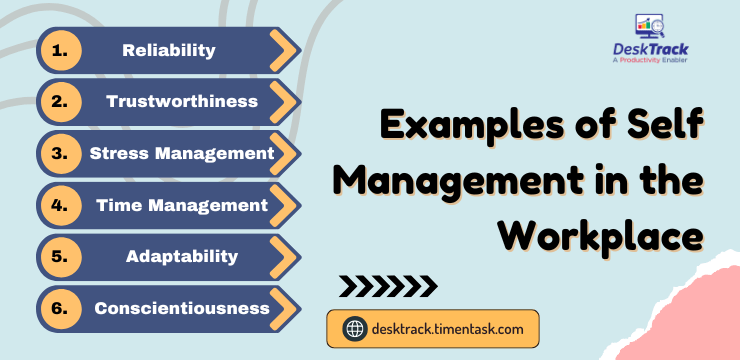
So far, so good. Till now we have covered a lot about how to manage ourselves. However, you must be curious as to how it works in real life. So, here are some examples of good employee self management skills.
1. Reliability
A good example of managing self at work is of a reliable person. A reliable colleague can perform their tasks and duties on schedule, accurately, and promptly. This is important because it allows other individuals to know that they can count on that person to do what they say they will do.
2. Trustworthiness
Here’s another example of employee self management skills. A trustworthy person can be honest, trustworthy, and dependable. They are willing to put their reputation on the line by taking responsibility for their actions.
3. Stress Management
If you can cope with stress, come up with strategies when things become difficult, and overcome obstacles that are thrown at you then you have achieved it. You can now safely say that you can manage yourself in the workplace.
4. Time Management
People who manage their time effectively know how much time they have each day and how best to use it wisely. They are the perfect example of those who have mastered employee self time management skills.
5. Adaptability
Adaptability is the sense that new situations don’t throw you off balance too much. After developing skills for managing yourself, if something unexpected happens, it doesn’t throw off your whole routine completely but instead makes a small change that doesn’t disrupt things too much overall.
6. Conscientiousness
Conscientiousness is the ability to plan and organize tasks, even when they are not easy. It is also known as perseverance or hard work. It is the most important example of employee self management skills.
How Can You Improve Self Management Skills?
Have you ever spent time watching binge-series late at night, even when you know that you will have a busy next day working? If yes, you are surely going to miss the work deadline which can affect your credibility and mount work pressure on you. If you are serious about how to improve self management skills in the workplace, then we have a list of ways for you.
1. Clarity of the Role
To master employee self management skills, you must have a clear understanding of rolesand be aware of duties, the importance of your work, and evaluation criteria. In this situation, employees know how not to rely on others to complete the work. In simple words, having clarity in your role will certainly help you manage the workflow. In summary, we know our place in the system and how our efforts benefit the organization.
2. Alignment of Goals
Collaborating with team members is essential for an organization to succeed. We all need to see the broad picture and link our objectives with those of the organization for this to work with a team of people managing themselves at work. By doing this, we’ll be able to stay on course and keep our end goal in mind. You will be connecting with the team and learning some key strategies for product development.
3. Having a Right Schedule List
One of the important ways of improving your employee self management skills is to create the right schedule list. Look at the overall job you have to do either that day or within a week when you start your workday. Set a clear time limit for when you will finish each of the smaller jobs, and now prioritize the assignment.
Make sure you schedule breaks as well. Do not rush to finish the job if you believe you cannot accomplish too much in a day. This will enable you to work effectively without having any second thoughts. Additionally, this will assist you in honing skills to manage yourself in the workplace.
4. Setting up the Priority
Another effective way to improve good employee self management skills in the workplace is to set up the priority. This can ensure that even if other demands on our time increase, you will complete the most crucial jobs and projects on the set deadline. You can analyze what is important and how much time you will need to complete the first stage of the plan. To accomplish the set work by the deadline, you will need to set aside time in the calendar to work on this project, and you can easily communicate with stakeholders to push out less crucial initiatives.
5. Evaluating Strengths and Weaknesses
A great part of managing yourself at work is to know your strengths and weaknesses. In the long run, it will be beneficial for you to be aware of your strengths and create space for them to grow. Additionally, it will make it clear to you which chores will be simple to perform and which won’t. You’ll have more time to work on the ones you believe are tough if you concentrate on finishing the ones that are simpler for you.
6. Performing One Task at a Time
It is one of the greatest employee self management skills. An effective way to complete your task on time is to perform one task at a time. This way you won’t be able to get distracted and you can complete your work on time. This works best when you are working from home. You should finish each assignment before moving on to the next one to effectively manage your time and effort.
7. Aligning the Right Level of Engagement
From the executive table to contributors, managing oneself at work involves appropriate participation in the work varies. When it comes to aligning the work, you need to consider the strategy to execution, which comprises from “why” through “what” to “how.” Maintain your attention on the relevant area for your role. For instance, as a product manager, one of your responsibilities is to convert the “why” to “what” of specific projects. Finding out how to complete those tasks is not your responsibility.
Read Also: Top 15 Benefits of Time Management Skills for Everyone
8. Meet Yourself
Another way to improve your employee self management skills is this. It is essential to spend time with yourself to reach your goal. Make time for yourself so you can follow your goal. Set up at least an hour each week for a meeting where you may assess your progress, list issues, identify opportunities, and update your plans for the upcoming week, month, or quarter. You might do this every day to “check out” right in the office which will help you to know how you can start your day.
9. Self-Nurture
One of the important methods of developing skills for managing self at the workplace is to nurture the self. Right from taking care of your health to keeping yourself calm, it is important to conduct a self-nurture regime.
10. Taking Breaks
If you have not mastered employee self management skills, work can easily consume you, and spending all of your time at your desk is counterproductive. Taking breaks at a regular time gives you the chance to relax and refuel. Consider visiting a co-worker, taking a nature walk, or calling your lover while at work.
11. Self-Motivation
Another way to better manage yourself in the workplace is self-motivation. Motivate yourself to believe that you can repeatedly. This way, you will soon be able to accomplish everything. Even the seemingly impossible tasks.
12. Time Management
One of your crucial employee self management skills is time management. We all have limited time.
However, those who can accomplish more within the same hours have mastered this skill. A great way to effectively manage your time is to use time tracking software.
13. Decision-Making
Another one of the skills for managing self is better decision-making. There are always times when we think, we wish we had taken the other choice. Optimized decision-making is when we have no regrets regarding our decisions.
14. Problem-Solving
Becoming better at employee self management skills also involves not relying on others to solve your problems. The more independent you are, the better you will be able to navigate the complexities of the modern world.
15. Self Awareness
Did you know that according to Dr. Tasha Eurich, an organizational psychologist, 95% of people claim to be self-aware? However, only 10 to 15% of them are.
As we mentioned before skills for managing self and self-awareness are interrelated. So that’s that. When you are aware of yourself, managing yourself becomes simpler.
Read Also: Top 10 Best Habit Tracker Apps for Business and Personal Use
Benefits of Self Management Skills
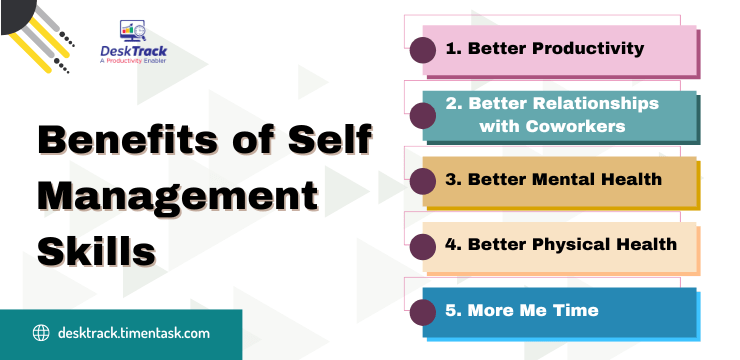
There are many benefits to being better at employee self management skills. It allows you to be more productive, save money, and make better decisions. However, wait, there is more to where that came from.
1. Better Productivity
Managing oneself at work is about being in charge of your own life. It involves taking responsibility for your actions, choices, and outcomes rather than blaming others or circumstances for what happens to you.
2. Better Relationships with Coworkers
One of the benefits of improving employee self management skills is this. Managing your time so that you can spend more time with those who are important to you will improve your relationships with coworkers and make working together easier.
3. Better Mental Health
Being able to set goals is a great way to help manage yourself in the workplace and your mental health and feel good about yourself. It also helps with stress management because it helps you understand how you’re feeling so that you can take action toward feeling better.
4. Better Physical Health
A lack of employee self management skills causes stress which can lead to poor eating habits, increased alcohol consumption, smoking, and other unhealthy behaviors which could have an impact on your physical health as well as your overall wellbeing. That’s why it is essential to properly manage yourself.
5. More Me Time
Being able to manage oneself in the workplace means that you will have more time for yourself. You can spend this “me time” any way you want. All together, it makes work-life balance much simpler.
Conclusion
I hope that you are now clear about employee self management skills and their importance. Self awareness, prioritization, adaptability, and discipline are not just buzzwords. They are the way of living and surviving the complexities of today’s work world and environment. These skills are not only helpful at work but they also give you an advantage over others in your daily life. However, it’s not only your part to improve the skills for handling yourself well but also your employer’s part. Your team leader, manager, boss, or superior must also evaluate how good you are at these skills and then give you examples of how you can be a better version of yourself. Plus, you can also check strategies to be better at managing and balancing your work and personal life. Overall, knowing what it is and how to improve at self awareness and management is the key to success.
Frequently Asked Questions (FAQ)
Q. What are Employee Self Management Skills?
Ans. Employee self management skills are a set of capabilities that make employees self aware. This allows them to be aware of their roles and responsibilities, become independent, and mentally and emotionally strong to navigate the complexities of today’s work world and enviornment.
Q. What are Some Ways to Develop Self Management Skills?
Ans. You can use these strategies to become better at managing yourself.
- Clarity of the Role
- Alignment of Goals
- Having a Right Schedule List
- Setting up the Priority
- Evaluating Strengths and Weaknesses
- Performing One Task at a Time
- Aligning the Right Level of Engagement
- Meet Yourself
- Self-Nurture
- Taking Breaks
- Self-Motivation
- Time Management
- Decision-Making
- Problem-Solving
- Self Awareness
Q. What are the Examples of Managing Oneself?
Ans. The qualities of a self-managed person would be:
- Reliability
- Trustworthiness
- Stress Management
- Time Management
- Adaptability
- Conscientiousness
